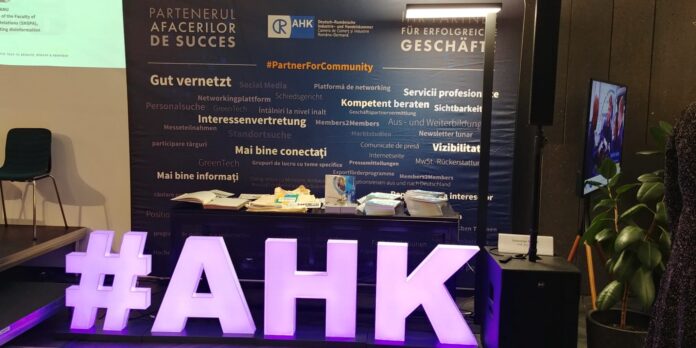Challenges such as high labor costs, fiscal predictability and the trade deficit remain in the spotlight, because we believe that a competitive economy needs a modern administration, argues president of the Romanian-German Chamber of Commerce and Industry – AHK Romania Andreas Lier, who attended on Thursday evening the AHK New Year’s Reception at the Palace of Parliament.
Competitiveness as a basis for increasing economic efficiency and overcoming current challenges is a theme omnipresent in all areas of activity, from food to energy, the organization said in a release on Friday.
„We want to use the potential of the entire energy sector, renewable energies in particular, to increase efficiency. We will also focus on developing value chains in the food sector. At the same time, challenges such as high labor costs, fiscal predictability and the trade deficit remain in the spotlight, because we believe that a competitive economy needs a modern administration,” Andreas Lier said.
According to him, competitiveness is part of the development strategy for the Romanian-German business environment in 2025. AHK Romania member companies put competitiveness at the center of their concerns, along with employees and their skills. The business environment considers the European theme to be essential for facing the challenges of global markets and for developing sustainably, which is why AHK Romania, together with its member companies, has chosen „People. Skills. Competitiveness” as the motto to guide their activity throughout 2025, the cited source states.
„Having chosen ‘People. Skills. Competitiveness’ as our annual theme for 2025, we put emphasis on the central role of employees in the success of a company, because their skills represent the central pillar for strong, competitive and innovative businesses,” said AHK Romania CEO Sebastian Metz at the opening of the reception.
Present at the event, Senate President Ilie Bolojan remarked that German investments in Romania are a key component for the country’s economic development. „Germany is our main trading partner and one of the largest foreign investors in our country,” said Bolojan, who also mentioned the need for cooperation to continue in other areas, such as education, research, digitalization, for a better integration of young people into the labor market. The Senate head also promised the support of the government and Parliament for dual education projects, by the successful model initiated by the Romanian-German Chamber of Commerce.
„Romania has proven in recent years that it can take fast steps towards modernization when there is a clear vision and efficient administration. Whether we are talking about infrastructure, education or economic development, success comes where well-thought-out decisions are made and implemented without delay. This is the working model that we must extend at national level: to focus on concrete solutions, to eliminate bureaucratic gridlocks and to create an environment where investments can thrive,” concluded Ilie Bolojan.
Education Minister Daniel David took the idea of change further, as he emphasized the need to train the future workforce on sound foundations. Therefore, he invited the private sector to be the ministry’s partner in reforming the educational system, both for university and pre-university education, especially dual.
„Our children must be exposed to the best specialists, whom they can meet through the practice opportunities you offer. We opened universities to include company criteria and needs in master’s and postgraduate programs, to train the human resources you need. In dual education, mutual responsibility is even greater: together we design curricula, together we make assessments and then take responsibility for what we put on the market,” David explained.
Competitiveness is an asset the Romanian state also needs, and people working in the public system need to be just as efficient as the people in private companies, considers Deputy Prime Minister and Finance Minister Tanczos Barna, who pointed out that the budget approved this week by Parliament „is leaner, with spending cuts to streamline operations, a record-high investment budget of over RON 150 billion, and a budget to support the companies’ programs”. According to him, for a successful economy, the active population needs to be more engaged in production, and the government will also work on this issue.
Minister of Labor, Family, Youth and Social Solidarity Simona Bucura-Oprescu, and Minister of Economy, Digital Transformation, Entrepreneurship and Tourism Bogdan Ivan were also present at the event, conveying the message of their ministries to the Romanian-German business communities.
In his turn, ambassador of the Federal Republic of Germany Peer Gebauer emphasized the importance of the partnership between Romania and Germany and the good cooperation between the two countries, particularly in the field of energy and the expansion of energy infrastructure. For these changes to take place, competent people are needed: „2025 will be a year of transformations. We embrace this motto, we need people, their skills, which will become increasingly diverse in the future, we need a spirit of innovation and a willingness to take risks,” said the diplomat.
Organized every year at the Palace of Parliament, the AHK Romania New Year’s Reception is a landmark event for Romanian-German business, bringing together numerous guests from the business milieu, public administration, professional associations, civil society, as well as from the political, diplomatic, academic and mass media environments.
AHK Romania is the official representation of the German economy. Established in 2002, AHK has over 670 member companies and offers businesses an important platform for networking, exchanging information and experience.
AGERPRES




